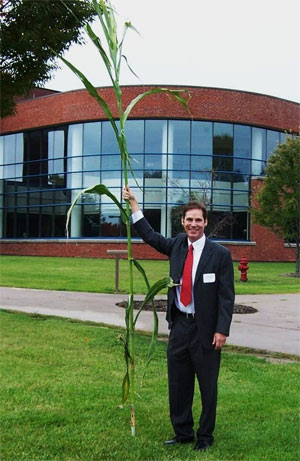The
Initially, the market will be biofuels, as Sweetwater sells the liquid starches it extracts to bio-refineries to produce ethanol. Sweetwater’s business plan calls for its portable processors, known as “SweetMachines,” to separate sugar and water from corn plants right on the farm. Sugars would then be concentrated and shipped to ethanol refineries, chemical refineries, and jet fuel refineries, while the fibrous material is used either right at the farm as an animal feed or pelletized for use as a fuel. Company officials say the big cost advantage from the process is reduction of transportation and energy costs.
“It’s a very hot space now,” says Jack Baron, Sweetwater’s chairman and CEO. Baron, a co-founder of Fairport, N.Y.-based telecom firm PAETEC who has long been interested in alternative energy, invested in Sweetwater after leaving PAETEC.
Baron, who started out as an organic chemist with a degree from the
As the company grows, plans call for
Excess Carbs Put To Highest and Best Use
The bio-plastics market for Sweetwater is potentially huge, Baron says. Initial end uses would likely be biodegradable garbage bags and disposable diapers. He says the sugar-based garbage bags will biodegrade in just three days in a landfill.
“You can make from sugars most of the same products that you can make from petrochemicals,” Baron says. “We’re working with a company now to use our sugars to make trash bags. The bio-plastics industry is going crazy right now, and we will be focused on this market a great deal. It’s nice that there are renewable alternatives.”
Sweetwater is already selling its product to a division of the U.S. Dept. of Defense for testing for possible use as a jet fuel.
Sweetwater is currently looking for sites in the
Baron says the Energy Policy Act of 2005 and the subsequent Energy Independence and Security Act of 2007 have the effect of requiring that 36 billion gallons of transportation fuel come from biofuels by 2022. Of that amount, 16 billion gallons is designated to come from cellulosic biofuels such as those refined from Sweetwater’s product.
“The demand for biofuels will triple over the next 11 years by law,” Baron says. “The market is clearly enormous. There were 13 billion gallons of ethanol sold in the
Sweetwater was founded by Jerry Horton, who used his extensive experience as an engineer in the food processing sector and as a farmer to develop a method to extract unwanted carbohydrates from the feed he gave his cows. He developed a higher-protein feed and in the process discovered that the excess carbohydrates made a great feedstock for refining into biofuels.
Horton founded Sweetwater in 2007 and has worked with scientists at the Rochester Institute of Technology and
